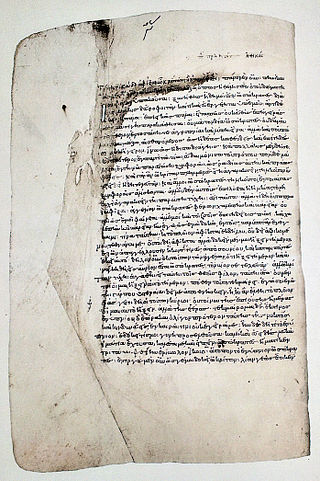Related Research Articles

Plato, born Aristocles, was an ancient Greek philosopher of the Classical period who is considered a foundational thinker in Western philosophy and an innovator of the written dialogue and dialectic forms. He raised problems for what became all the major areas of both theoretical philosophy and practical philosophy, and was the founder of the Platonic Academy, a philosophical school in Athens where Plato taught the doctrines that would later become known as Platonism.
The Trial of Socrates was held to determine the philosopher's guilt of two charges: asebeia (impiety) against the pantheon of Athens, and corruption of the youth of the city-state; the accusers cited two impious acts by Socrates: "failing to acknowledge the gods that the city acknowledges" and "introducing new deities".
Eudaimonia, sometimes anglicized as eudaemonia or eudemonia, is a Greek word literally translating to the state or condition of 'good spirit', and which is commonly translated as 'happiness' or 'welfare'.

Euthyphro, by Plato, is a Socratic dialogue whose events occur in the weeks before the trial of Socrates, between Socrates and Euthyphro. The dialogue covers subjects such as the meaning of piety and justice. As is common with Plato's earliest dialogues, it ends in aporia.

Crito is a dialogue that was written by the ancient Greek philosopher Plato. It depicts a conversation between Socrates and his wealthy friend Crito of Alopece regarding justice (δικαιοσύνη), injustice (ἀδικία), and the appropriate response to injustice after Socrates's imprisonment, which is chronicled in the Apology.
The Apology of Socrates, written by Plato, is a Socratic dialogue of the speech of legal self-defence which Socrates spoke at his trial for impiety and corruption in 399 BC.

Socratic dialogue is a genre of literary prose developed in Greece at the turn of the fourth century BC. The earliest ones are preserved in the works of Plato and Xenophon and all involve Socrates as the protagonist. These dialogues, and subsequent ones in the genre, present a discussion of moral and philosophical problems between two or more individuals illustrating the application of the Socratic method. The dialogues may be either dramatic or narrative. While Socrates is often the main participant, his presence in the dialogue is not essential to the genre.
Phædo or Phaedo, also known to ancient readers as On The Soul, is one of the best-known dialogues of Plato's middle period, along with the Republic and the Symposium. The philosophical subject of the dialogue is the immortality of the soul. It is set in the last hours prior to the death of Socrates, and is Plato's fourth and last dialogue to detail the philosopher's final days, following Euthyphro, Apology, and Crito.

Georg Anton Friedrich Ast was a German philosopher and philologist.
Sophroniscus, husband of Phaenarete, was the father of the philosopher Socrates.
Simmias of Thebes was an ancient Greek philosopher, disciple of Socrates, and a friend of Cebes. In his Memorabilia, Xenophon includes him in the inner circle of Socrates' followers. He appears in Plato's Phaedo as a main discussion partner of Socrates alongside Cebes, as well as Crito, Phaedrus, and EpistleXIII.
John Burnet, FBA was a Scottish classicist. He was born in Edinburgh and died in St Andrews.

Georges Maximilien Antoine Grube was a Canadian scholar, university professor and democratic socialist political activist. Grube was a classicist and translator of Plato, Aristotle, Longinus and Marcus Aurelius. He was one of the founders of the New Democratic Party of Canada and ran unsuccessfully for election as an NDP candidate in Canadian federal elections.
This page is a list of topics in ancient philosophy.

Crito of Alopece was an ancient Athenian agriculturist depicted in the Socratic literature of Plato and Xenophon, where he appears as a faithful and lifelong companion of the philosopher Socrates. Although the later tradition of ancient scholarship attributed philosophical works to Crito, modern scholars do not consider him to have been an active philosopher, but rather a member of Socrates' inner circle through childhood friendship.

Plato's theory of thesoul, which was inspired by the teachings of Socrates, considered the psyche to be the essence of a person, being that which decides how people behave. Plato considered this essence to be an incorporeal, eternal occupant of a person's being. Plato said that even after death, the soul exists and is able to think. He believed that as bodies die, the soul is continually reborn (metempsychosis) in subsequent bodies. Plato divided the soul into three parts: the logistikon (reason), the thymoeides, and the epithymetikon.

Socrates was a Greek philosopher from Athens who is credited as the founder of Western philosophy and among the first moral philosophers of the ethical tradition of thought. An enigmatic figure, Socrates authored no texts and is known mainly through the posthumous accounts of classical writers, particularly his students Plato and Xenophon. These accounts are written as dialogues, in which Socrates and his interlocutors examine a subject in the style of question and answer; they gave rise to the Socratic dialogue literary genre. Contradictory accounts of Socrates make a reconstruction of his philosophy nearly impossible, a situation known as the Socratic problem. Socrates was a polarizing figure in Athenian society. In 399 BC, he was accused of impiety and corrupting the youth. After a trial that lasted a day, he was sentenced to death. He spent his last day in prison, refusing offers to help him escape.

Socrates is a 1971 Spanish-Italian-French television film directed by Roberto Rossellini. The film is an adaptation of several Plato dialogues, including The Apology, Euthyphro, Crito, and Phaedo.
Ronna C. Burger is an American philosopher and Professor of Philosophy, Catherine & Henry J. Gaisman Chair, and Sizeler Professor of Jewish Studies at Tulane University.
References
- ↑ "C.D.C. Reeve Delta Kappa Epsilon Distinguished Professor". University of North Carolina. Retrieved 24 April 2011.